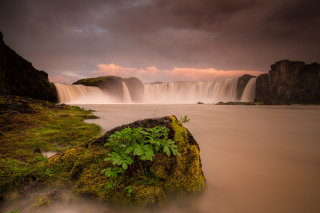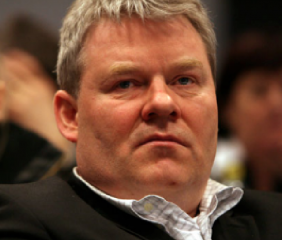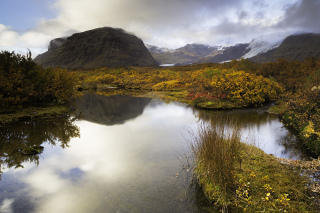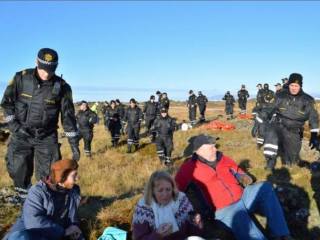Iceland once was set as an example of unspoiled nature, clean energy and extraordinary financial recovery. Unfortunately, lately the strong Atlantic winds of change start to blow in the wrong direction.
By Julia Vol
In the wake of the devastating financial crisis that brought Iceland to its knees, the people took charge, went out on the streets and demanded the right-wing government to quit what later will be named the “pots and pans revolution”. The right-wing government, led by the Independence Party, was deeply involved in corruption and notoriously known for its crony capitalistic approach in reaching for the country’s leadership, which eventually led to the economical collapse.
The new social-democratic alliance led by Johanna Sigurðardóttir came to power in May 2009, and in the aftermath of the financial collapse had a lot of mess to clean and painful decisions to make. However, under Sigurðardóttir’s leadership the economic situation stabilized and recovery came about quicker than expected. In the years to follow, Iceland was often quoted as an example for economic recovery to fellow crisis countries such as Greece and Ireland. In addition to essential financial reforms and regulations, the social-democratic government set the foundation for long-term social and environmental sustainability. Natural preservation laws and committees were put forward to minimize the exploitation of Icelandic natural resources for monetary profit, green economy plans were outlined by the Parliament, and sustainability considerations started to receive growing attention in decision-making processes.
Many Icelanders even claim that the crisis turned out to be somewhat a positive thing, breaking the “gold rush” craze grasping the nation over the years prior to the crisis, and helping people get back to basic values and out of their arrogance and greed.
Still, apparently not enough Icelanders shared this optimistic view, as in April 2013 the right-wing coalition led by the infamous Independent and Progressive Parties were voted back into the government, by a majority of 51% of the votes. Only four years after being disgracefully thrown out of Parliament, the two parties were back on the top again. With less than a year in power, things seem to take a backward turn to the worse quite quickly, especially in regards to issues of natural preservation, social justice and governance on the little island.
A More Utilitarian Use of Nature
The results of the administration switch were soon translated into action. Among the first steps of the new government was to cancel out the Ministry of Environment and merge it with the Ministry of Fishing and Agriculture. No conflict of interests there. The new minister of all the above declared upon entering the office, that his administration would be making more utilitarian usage of the Icelandic nature and refused to sign a bill initiated by the previous government to increase nature protection in Iceland. This promising start embodies the governments’ general line of argument: that whenever environmental considerations are part of the equation they will always count the least.
It’s All About Energy
The previous government had appointed a special professional committee to conduct the “Energy Framework”, a document aimed at providing guidelines on which areas of Iceland could be harnessed for power, and which shall be protected, aiming to regulate and limit the exploitation of natural resources for monetary profit. Shortly after coming to power, the new government called to cancel the Energy Framework guidelines and build a new shiny power plant in areas previously categorized as preserved. The government also dismissed over 400 letters from citizens who raised concerns over the new changes – in a manner that was widely described as arrogant and ignorant. Government officials claimed that experts’ opinions were more important than public opinion, while forgetting to mention that the two experts appointed to deal with the issues were politically appointed with no expertise in energy nor in preservation.
Over the course of the last half a year new plans have been laid out, setting the stage for more energy projects that violate the Energy Framework and the Icelandic conservation law. Experts from all fields are voicing their concerns and dissatisfaction over the very short-sighted environmental assessments made in the preparations for the new plants, warning constantly about the irreversible damage that will be done to Icelandic wilderness and disturbed ecosystems.
Worldly renowned natural areas such as the Mývatn lake, the Þórsjá river and the Icelandic highlands are put in danger of destruction, all for the cause of producing more energy for aluminum smelters. Lately, the Minister of Environment (and agriculture, and fishing), announced that he aimed to change the existing conservation law to allow further development in preserved areas around the Þórsjá river, including damming the river flow. This area (Þjórsárver, S.I. Ed.) has been protected by both the Environment Agency of Iceland and the Ramsar Convention since 1981. As expected, the Icelandic Nature Conservation Association strongly objected the plan, claiming that this will cause irreversible damage to the entire area and the surrounding waterfalls. The minister’s answer to these allegations was that it is okay to sacrifice several waterfalls for the purpose of economic profit which will come out of developing the area.
Infrastructure for Private Interests
The violation of the natural conservation law continued when last October the government presented a brand new program to construct a highway which will pass through an 8,000 year old protected lava field. This expensive plan has been approved by the government right after a long line of a very painful budget cuts in education, welfare, health, culture, research, arts and science (yet not in subsidies to heavy industry). Why such a rush to build a highway in a sparsely populated area in times of financial cuts? The answer followed soon: The family of the Minister of Finances is expected to greatly benefit from the development of this project.
Environmentalist groups appealed against the project to the supreme court, however, the government decided that waiting for the court decision would be a waste of time and gave green light to start the construction. This sparked a protest of concerned citizens, and many of them arrived to express their dissatisfaction with the construction. They were arrested for speaking their mind despite their completely peaceful protest. Among the arrested protesters were some very well-known journalists, professors and public figures, not exactly a group of hooligans. Today, some of these people are facing prosecution
for demanding the government to obey the law. This chain of events vividly demonstrates the government’s insistence on proceeding with its plans at all costs, using every possible tool to silence the opposition.“Enjoy the Icelandic Wilderness (Before it’s Too Late)!”
The disruption and destruction of the Icelandic nature reserves is not preventing the new government from attracting as many tourists as possible, and maximizing profits from marketing Icelandic wilderness before it’s all gone. Tourism is a very fast-growing industry in post-financial crisis Iceland. The number of tourists has tripled over the past 12 years passing the threshold of 1 million tourists in 2013 (keep in mind that the entire population of Iceland is 380,000 people!). Understandably, this raises concerns over the fragile Icelandic nature, which was never exposed to so many people at once. While the previous government was putting forward regulations and preservation plans, the new government announced that 1 million is not enough and aims to bring over 3 million tourists per year within the next few years. Already today the effects of this fast growing industry are evident all around the island: Massive tourism is damaging fragile ecosystems, and Icelandic cities are turning into tourist attractions with decreased space for the local population. Needless to say that such a steep increase in tourism will put strain on the ecological system, especially since there is still no regulation or infrastructure in place to prevent the long-term effects of massive tourism. No wonder then, that even the New York Times strongly recommended its readers to go to Iceland ASAP, before it’s too late.
To Whale or Not to Whale
The paradox of destroying nature while communicating and marketing the image of Iceland as a pure and unspoiled nature destination is very present in the whaling controversy. Last summer the whaling of Fin whales was renewed, and the new administration has also revoked the decision to limit whaling grounds around the capital in favor of whale watching areas. Note that whale watching is the most profitable tourism attraction in the capital area, however, there is an increasing amount of incidents where tourists pay to witness the magic of wild animals but end up watching a very bloody hunting process.
The paradox is that the demand for whale meat worldwide decreases, and that it would be much more profitable to preserve these magnificent creatures for whale watching only. But this does not fall in line with the internal interests of the Icelandic elite, where the family owning the whaling company is well connected. The whaling ships continue their work, and the saddest part of this paradox is that due to low demand many of the endangered animals end their life as dog food in Japan or as some marketing nonsense such as “whale beer”.
The Wheels of Greed are Spinning
Iceland is an amazing country and is home to some of the most creative, innovative, talented and entrepreneurial people. It has the potential to become a role model for a sustainable community in the middle of the Atlantic Ocean. For a brief moment there it looked that it might even come true. However, it seems that the strong Atlantic winds bring darker times along. Best put into words by the former Prime Minister Jóhanna Sigurðardóttir: “The current government’s priorities could not be more different from the ones honored by the last one. Inequality is once again rearing its ugly head, and the sharp knife of austerity has been turned towards the welfare system—all to benefit society’s wealthiest and best-off. Once more, the wheels of greed are spinning”.
First published 25 January on Worldwatch-Europe.org
Links:
http://grapevine.is/Home/ReadArticle/Minister-Of-Environment-Wont-Sign-O…
http://heartoficeland.org/
http://grapevine.is/Home/ReadArticle/Environmental-Minister-To-Change-Pr…
http://grapevine.is/Home/ReadArticle/Minister-Of-Environment-Would-Suppo…
http://thepalebluedot.me/2013/10/21/passion-for-lava/
http://grapevine.is/Home/ReadArticle/Ministers-Dad-And-Uncles-Profit-Fro…
http://visir.is/myndband-af-handtoku-omars-ragnarssonar/article/20131310…
http://grapevine.is/News/ReadArticle/Charges-Filed-Against-Galgahraun-Pr…
http://grapevine.is/Author/ReadArticle/27-Increase-In-Tourism-This-Year
http://grapevine.is/Author/ReadArticle/Travellers-Take-Their-Toll-On-Tou…
http://grapevine.is/Home/ReadArticle/Hotels-Motels-Holiday-Inns
http://www.nytimes.com/interactive/2014/01/10/travel/2014-places-to-go.html
http://www.theguardian.com/environment/2013/jun/19/iceland-fin-whale-hun…
http://grapevine.is/Home/ReadArticle/City-Hall-Wants-Answers-On-Whale-Wa…
http://www.theguardian.com/environment/2014/jan/08/icelandic-whale-beer-…
http://grapevine.is/Features/ReadArticle/A-Look-In-The–Rearview-Mirror-





